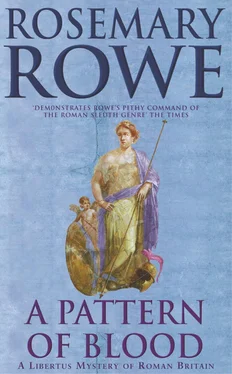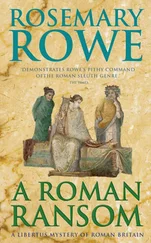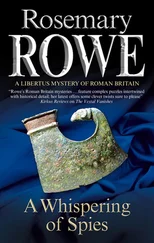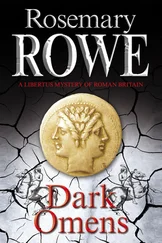Rosemary Rowe - A Pattern of Blood
Здесь есть возможность читать онлайн «Rosemary Rowe - A Pattern of Blood» весь текст электронной книги совершенно бесплатно (целиком полную версию без сокращений). В некоторых случаях можно слушать аудио, скачать через торрент в формате fb2 и присутствует краткое содержание. Год выпуска: 2000, ISBN: 2000, Издательство: Headline, Жанр: Исторический детектив, на английском языке. Описание произведения, (предисловие) а так же отзывы посетителей доступны на портале библиотеки ЛибКат.
- Название:A Pattern of Blood
- Автор:
- Издательство:Headline
- Жанр:
- Год:2000
- ISBN:9781472205063
- Рейтинг книги:4 / 5. Голосов: 1
-
Избранное:Добавить в избранное
- Отзывы:
-
Ваша оценка:
- 80
- 1
- 2
- 3
- 4
- 5
A Pattern of Blood: краткое содержание, описание и аннотация
Предлагаем к чтению аннотацию, описание, краткое содержание или предисловие (зависит от того, что написал сам автор книги «A Pattern of Blood»). Если вы не нашли необходимую информацию о книге — напишите в комментариях, мы постараемся отыскать её.
A Pattern of Blood — читать онлайн бесплатно полную книгу (весь текст) целиком
Ниже представлен текст книги, разбитый по страницам. Система сохранения места последней прочитанной страницы, позволяет с удобством читать онлайн бесплатно книгу «A Pattern of Blood», без необходимости каждый раз заново искать на чём Вы остановились. Поставьте закладку, и сможете в любой момент перейти на страницу, на которой закончили чтение.
Интервал:
Закладка:
‘Who exactly are you?’ I said, on an impulse.
‘Citizen?’ He sounded surprised, as well he might. Even Marcus was looking startled. It is not the kind of question one normally asks a slave.
‘Have you been with your master long?’ I persisted, and saw Marcus relax. That kind of questioning he could understand. If Mutuus had worked at one time for an enemy of Pertinax, he might well be a paid informant. Every important household had its share of spies. You could almost see Marcus working it out.
‘For Ulpius? A little less than a year. I came to him last Janus Feast.’
I waited for him to say more, but he didn’t, and I had to prompt him. ‘And before that?’
‘Before that I was in another household. Here, in Corinium.’
He was telling us nothing. Marcus tapped his baton impatiently. ‘Which household?’ he demanded.
There was a perceptible pause. The answer, when it came, astonished me. ‘The household of Paulus Avidius Lupus.’
‘Great Mercury! Of Lupus! The old man who came here this morning? There was a conspiracy, I knew it. Why did he come here, slave? Why did he send you here to spy?’
Mutuus raised his head defiantly. ‘I am no slave. I am simply a bondsman to Quintus, or was while he lived.’
I glanced at Marcus. That was no idle distinction. A man in civil bondage is not a mere living chattel, like a horse or a slave, to be disposed of or used at will. His labour, not his person, belongs to his master. And, as the young man suggested, bondage is often to a named individual. Such a bondsman is free on his master’s death.
‘ Mancipium ?’ I said, giving civil bondage its legal name, and mentally rehearsing the possible reasons why a man might find himself subjected to it. Debtors, gladiators, estate workers and ransomed prisoners of war were the usual categories. Mutuus did not seem to fit any of these. Perhaps he was one of those rare clientes — a poor free man, who had pleaded the ancient customs of republican Rome and thrown himself entirely on the mercy of his patron, binding himself in the process. But in that case, how had he come from Lupus’s household? There was one way to find out. I asked him.
He looked at me with new respect. ‘I am a distant kinsman of Lupus. My father, too, had money once, and gave me an education before he died and left me his debts. I repudiated the estate. I became a free-man scribe, and won a little reputation in the market place for the writing of letters and rendering accounts. Then Lupus heard of it. He needed a secretary. He took me into his household, and offered to adopt me as his heir, in return for my skills. I considered the offer for some months, but finally I acquiesced.’
I understood that. A good secretary is a rare prize, and Lupus must have been delighted with his bargain. Mutuus, for his part, would inherit the estate in a few years. What puzzled me was something else. ‘He hated Quintus. Why did he send you here?’
Mutuus almost smiled. ‘He did not send me here. Quintus demanded me, as legal recompense. He claimed I killed his servant in a street brawl.’
I hardly dared to breathe. ‘You attacked him in the street?’
‘And stabbed him? No. This was a year ago. I have wondered since whether Ulpius himself arranged it. Lupus had just adopted me formally; he had no direct heirs of his own, and we had to go before the magistrates to legalise the succession. We had just done so when Ulpius went by with his retinue. Naturally he had heard about it. He has long sought to destroy our family, as you may have heard, over an ancient grudge, and when he learned that Lupus now had a formal heir he was furious. I think he hoped there would be no clear line of inheritance, and then there would have been a hearing before the local curia and most of the estate would have ended up in the imperial coffers. No doubt Quintus, as a senior magistrate, would have got his share. There was a struggle.’
‘Quintus attacked you?’ Marcus was incredulous.
‘No. That would have been beneath his dignity. But his servants began hurling insults and then stones, and a scuffle broke out. One bumptious young scoundrel jeered threateningly at me, and I stepped forward and knocked him down. I did not mean to kill him, but according to Quintus, he died an hour later. I was taken before the tribunal. Lupus would have paid compensation, but Ulpius claimed that the slave was Greek and highly educated, and put such a high price upon him and his services that Lupus simply could not afford to pay. He was obliged to give me in noxal surrender, in recompense for the “debt” I owed. Ulpius made me his secretary and forced me to write his letters and witness his accounts. A compliment to my learning, he insisted, but in fact it was a way of parading me before his business cronies and humiliating Lupus.’
‘But he trusted you with his affairs?’ I was surprised. In Quintus’s position, I would have done nothing of the kind.
Mutuus shook his head. ‘Having got me, he trusted me with nothing important. He made it clear that he doubted my honour. He checked every word I wrote, and sent me away if there was anything really important to discuss. It was foolish really, he could have afforded any secretary he chose — but he could not bear that Lupus had a finer one. I think that is why he insisted on the noxal surrender.’
‘Noxal surrender!’ Marcus said. ‘Legal surrender into bondage in compensation for a wrong. I knew it was legally enforceable, of course, but it is years since I heard of the penalty being exacted. Noxal surrender of a slave, yes, or a horse. That’s common enough. But never of a son. Even an adopted one.’
‘If one has enough wealth,’ Mutuus said, ‘all sorts of ancient laws can be invoked. Especially if one is a senior officer of the curia. And it amused Ulpius to have me here.’
‘Just as it amused him to give you your bond name?’ I suggested. ‘Mutuus, the borrowed one.’ From what I was learning of Quintus, he would have found that humorous.
‘Exactly,’ Mutuus agreed. ‘Although, of course, I am his bondsman no longer. His death releases me. Lupus will have his desire.’
‘That is what he came for? To ask for your release?’
‘Or to bargain for it, I think. I cannot be sure. Ulpius did not permit written communication between us. In any case, Lupus did not write well. That is why he needed a secretary.’
‘Because of his stiff hand?’ I asked.
Mutuus shook his head. ‘I saw, today, that he was favouring his hand. He did not have a problem that I knew of. I only know that he could not write well — nor read for that matter — beyond carved capitals on inscriptions. He could read those. He took me out of town, more than once, to read me the inscriptions on the roadside tombs. I think he was proud of his achievement.’
‘But you did not see your adoptive father this morning?’
‘I saw him arrive, of course. He was in the ante-room with the other supplicants. I did not speak to him alone.’
‘Nor see him do anything suspicious?’
Mutuus smiled wryly. ‘Citizen, I was sent to this room. The door was closed and so were the windows. How could I see anything from here? There is glass in the windows.’
I saw Marcus glance at the windows. They were glazed, as Mutuus said, in the latest fashion, with little panes of expensive Roman glass — bluey-green in colour and wonderful for letting in light and keeping out draughts, but impossible to see through. He nodded in understanding.
‘I see. Thank you, citizen, you have been most helpful.’
The significance of the title was not lost on Mutuus. For the first time since he had entered the room there was a genuine smile on his lips. ‘Thank you, Excellence. Please let me know if I can be of further help.’ He bowed deeply and left the room.
Читать дальшеИнтервал:
Закладка:
Похожие книги на «A Pattern of Blood»
Представляем Вашему вниманию похожие книги на «A Pattern of Blood» списком для выбора. Мы отобрали схожую по названию и смыслу литературу в надежде предоставить читателям больше вариантов отыскать новые, интересные, ещё непрочитанные произведения.
Обсуждение, отзывы о книге «A Pattern of Blood» и просто собственные мнения читателей. Оставьте ваши комментарии, напишите, что Вы думаете о произведении, его смысле или главных героях. Укажите что конкретно понравилось, а что нет, и почему Вы так считаете.












